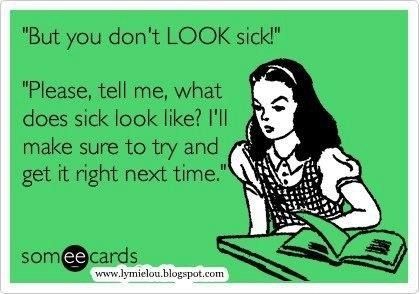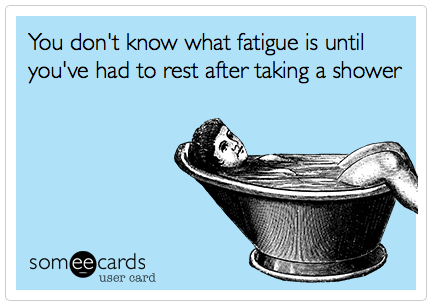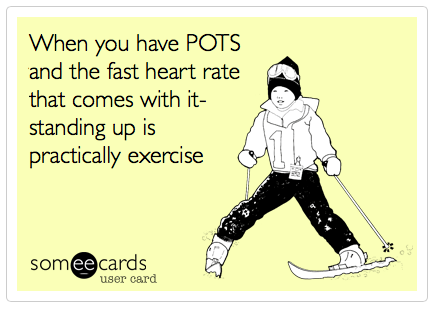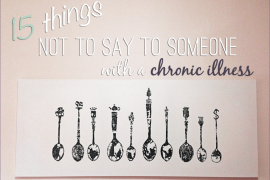It’s difficult to know how to deal with a friend or loved one who has a chronic or invisible illness. We learn that when you are sick you treat it and it goes away. Chronic conditions don’t go away. They are hard to understand.
Invisible illnesses are illnesses that you can’t see just by looking at someone. Things like Chronic Migraines, Lupus, Postural Orthostatic Tachycardia Syndrome, Fibromyalgia, etc. don’t affect your appearance, but they affect how your body functions and feels. Every day. Probably for the rest of your life.
When you say these things to someone with a chronic illness, you probably don’t mean to hurt their feelings. A lot of the time you are just trying to understand or sympathize. Well, from the perspective of a chronic illness sufferer, here are 15 things you should never say to someone with a chronic illness:
1. You don’t look sick
Not everyone “looks like” what is happening to them. You would never say “you don’t look like someone who is going through a terrible divorce” if your stressed out friend still manages to put on a brave face and pull themselves together. Not all illnesses are manifested outwardly. And chances are, on the days that you are seeing someone with a chronic illness, it is one of their better days because they are out at all. Everyone is going through some kind of struggle in their lives, and chances are, you can’t see it on the surface.

2. You’re too young to be sick
I get this one more than #1. We expect teens and 20-somethings to be the picture of great health. And a lot of people get illnesses as their bodies age. But no one is “too young” to be anything. You can get any kind of illness no matter your age. You can go through any kind of stressful or positive situation no matter your age. Age is completely irrelevant here. Young does not always equal healthy. When you say this to someone who is young it just makes them feel even more guilty or embarrassed for having an illness they have no control over when society expects them to be healthy.
3. Everyone gets tired
That may be true. And most people are not getting enough sleep and rest. But the difference between someone with a chronic illness associated with fatigue and an otherwise healthy person is the level of fatigue. If I go out drinking with friends and stay up late, it could take me a week to recover. I have to carefully plan every activity of the day so that I can save energy to do all of them. My favorite line I’ve heard for this one is: you don’t know what fatigue is until you’ve had to rest after taking a shower. Unless you literally think to yourself “how much energy will that take?” for every single action you take during the day (including brushing teeth, combing hair, standing to do dishes, putting on makeup, cleaning, driving, etc.) then you experience a completely different kind of tired than people with chronic illnesses. I’m not saying you aren’t tired. Everyone does get tired. But my kind of tired is not the same as a healthy person’s kind of tired. If I push myself past the amount of energy I have in a given day, the consequences are pretty bad. See the spoon theory for more about this one.

4. You’re just having a bad day
I know you are trying to motivate someone and make them feel better when you say this, but it doesn’t come off like that. Personally, only about 10 people in my life see me on my bad days. If I am outside, dressed, and active, that is a good day. So instead of making someone with a chronic illness feel supported and motivated when you say this, it feels like you are brushing off their symptoms. Chronic illnesses are with you for life. You can change your lifestyle and find treatments to help them, and some of them can be “cured,” but for the most part, that person will have to deal with a lot of bad days for a lot more years. Hearing this can be discouraging.
5. It must be nice not having to go to work/school
This one. Oh man. If you only knew. Sure, it can feel that way when you take a day to play hooky or a long vacation. But when you are forced not to go to work or school, even when you want to be there, it is a whole different story. People with chronic illnesses don’t want to fall behind in school and fight with the school district to get accommodations they need. People with chronic illnesses don’t want to miss work and not be able to generate an income. Everyone wants independence. Personally, I loved school and hated every day I wasn’t there. It is way more stressful not being in school and knowing all the work you will have to do to make up for it than being there on any given day. And I have loved the jobs I’ve had and been sad about every day I have missed. Believe me, it is not nice having to stay home instead of being productive, just trying to find ways to distract yourself from pain or exhaustion. It’s fun to watch TV for a day or two- but after that- you feel trapped. I guarantee anyone with a chronic illness would gladly trade in their symptoms for a full time job. Some people just aren’t physically capable of that.
6. You need to get more exercise
Exercise is really important and no one is denying that. It helps pretty much any health condition. But it isn’t a cure-all. For someone like me, whose heart rate regularly reaches 120 bpm just from standing still, exercise isn’t always doable. I do “exercise” but it is more like physical therapy exercises than what most people would consider a good work out. But remember, everyone has limitations. For people with chronic illnesses, their physical limitations may make it harder for them to do traditional exercises. And even if they do, it will probably not be a cure for a condition that is caused by something totally different like an immune system that attacks itself or a nervous system that doesn’t regulate itself correctly.

The list is not complete! To see the rest of the list, visit pinsandprocrastination
15 Things You should NEVER Say to Someone with a chronic illness


